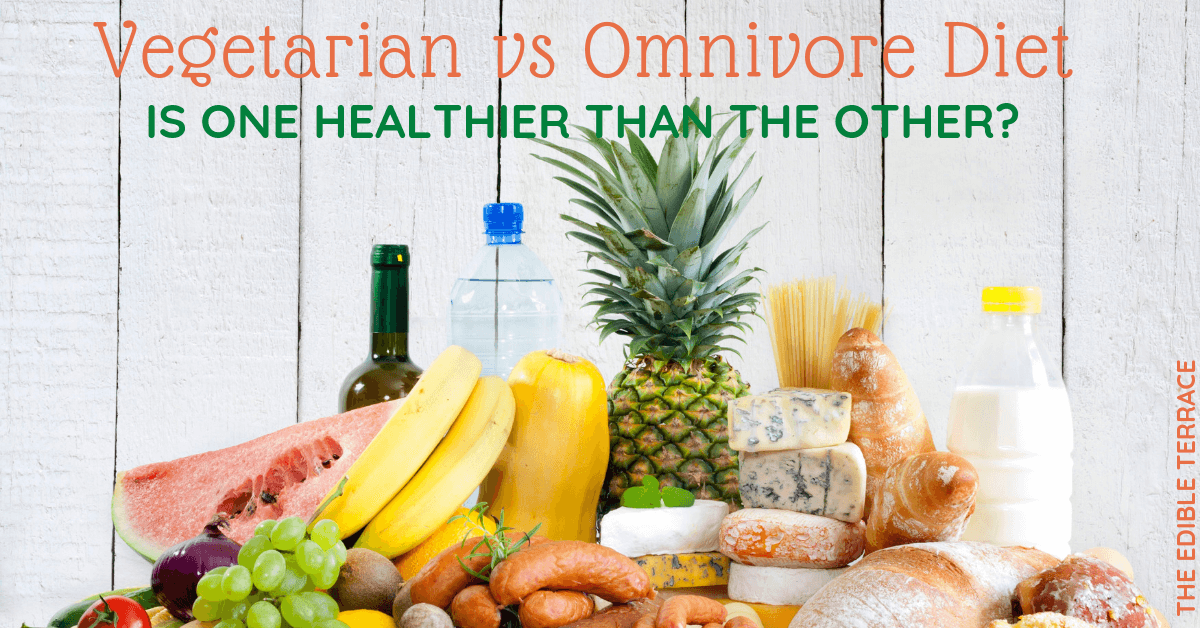Hey! By the way… TheEdibleTerrace is reader-supported. When you buy through links on our site, we may earn an affiliate commission and as an Amazon affiliate, we earn from qualifying purchases. Thanks in advance for your support!

Mirror, mirror on the wall. Who is the healthiest of them all? This age-old debate has preoccupied researchers, physicians, politicians, and everyday citizens for thousands of years.
People in the Western world are especially obsessed with their health. Hundreds of diets flood the media, and countless health magazines line the store shelves. In particular, there has been a lot of controversy about whether a vegetarian diet is healthier than a non-vegetarian diet.
Did you know vegetarianism goes waaay back? Pythagoras, the Greek mathematician born in 570BC, ate a “fleshless diet” known until the late 1800’s as the Pythagorean diet (when the name was changed to vegetarian). Other famous classics are the Buddha, Leonardo da Vinci, Gandhi and Albert Einstein to name just a few.
Vegetarians, and many researchers, have long insisted that a non-meat diet helps reduce the risk of certain diseases and makes it easier to lose weight, while meat eaters insist that vegetarians do not get enough protein and other key nutrients.
Research from Harvard University suggests that vegetarians have lower BMI’s and are less prone to Type 2 diabetes and heart disease.
So, what is fact and what is fiction?
Vegetarians Vs. Omnivore Diet – The Truth

Studies show that vegetarians have a lower body mass index than meat eaters. Meaning that they tend to weigh less, have a lower risk of heart disease, Type 2 diabetes, and incidence of cancer.
Regarding the claim that vegetarians do not get enough protein, this is easily addressed if one is conscientious about her diet. There are plenty of foods that are high in protein, including nuts, beans, legumes, whole grains, tofu, even fruits and vegetables.
Most vegetarians have no issue getting enough protein – especially those who eat eggs and consume dairy products. However, they do sometimes have an issue with getting enough B12, so vegetarians are often encouraged to take a vitamin B12 supplement.
Regarding meat, some studies show that meat eaters have a higher risk of heart disease, obesity, and other diseases, while other studies say that vegetarians actually have a higher risk of heart disease, cancer, depression, anxiety, and other disorders.
The reasons for these discrepancies are relatively straightforward:
- Many people who choose a vegetarian diet are more health-conscious in general and thus make other healthy lifestyle choices (e.g., not smoking, not drinking heavily).
- Many people who become vegetarian choose to do so because of existing, ongoing health problems that they want to improve (e.g., diabetes, allergies, anxiety).
Thus, vegetarians may seem healthier in general because of other healthy lifestyle habits, or on the flip side, they might have disorders and problems that meat eaters do not have because they developed these conditions and then became vegetarian to try to reduce these problems. Studies that do not control for these factors may present incorrect information.
In many cases, a vegetarian is not necessarily healthier than a meat eater. It all comes down to individual choices. A vegetarian who consumes a lot of sodium, sugars, refined grains, and saturated fats is not healthier than a meat eater who consumes a lot of fruits and vegetables.
[easyazon_infoblock align=”right” identifier=”1936493969″ locale=”US” tag=”veggie08-20″]
Choosing A Lifestyle
There are many reasons that people choose to eat a meatless diet; some are ethical in nature, others are for religious reasons, some people simply cannot tolerate eating anything that once lived and breathed, and others just feel that it is a healthy choice.
Conversely, many love steak and chicken, so for them, choosing this type of lifestyle can prove difficult, unless there is compelling motivation to quit eating meat. Remember, a diet that includes meat can be healthy.
The Healthiest Foods to Incorporate Into Your Diet
A reason that studies show a higher risk of heart disease, obesity, and other problems in meat eaters is due to saturated and trans fat. Meats, especially red meats, are high in saturated fat.
For the healthiest diet possible, focus on a menu that is rich with the following items:
- Vegetables
- Fruits
- Whole Grains
- Legumes
- Nuts
- Plant-based Oils
- Seeds
Regardless of being a vegetarian or meat eater, the foods that you consume on a regular basis dictate how healthy you will be.
Conclusion
Focus on the seven foods above to reduce your risk of heart attack, obesity, Type 2 diabetes, and other diseases. Monitor the amount of saturated fats that you consume, and if you are a meat eater, consider swapping your steak for grilled chicken or fish. With the right diet and lifestyle choices, you can be healthy if you choose to include meat in your diet!
[et_bloom_inline optin_id=”optin_18″]


I’m an omnivore and I think you’ve totally hit the nail on the head. It’s not that a vegetarian diet is by definition healthier, the key is that most people who don’t care about their health are omnivores. And most people don’t care, so we must conclude most omnivores don’t care. Thanks for offering a balanced view despite your personal option. And I agree that people are also clueless about vegetarianism.
Thanks for the feedback Paola. I’m not sure that omnivores don’t necessarily care about their diet. Many people don’t pay attention to it until they have a health scare – which is what happened to me. And before that I did care and thought I was doing a fairly decent job of eating the right foods but I wasn’t. That took much self-education on my part. Unfortunately too, the SAD (standard American diet) doesn’t help us in making smart decisions either. It is too focused on sugary, greasy, processed foods. The market incentivizes us to buy chemical laden processed foods and de-incentivizes us to buy healthy, fresh foods (by making it harder to find and expensive).